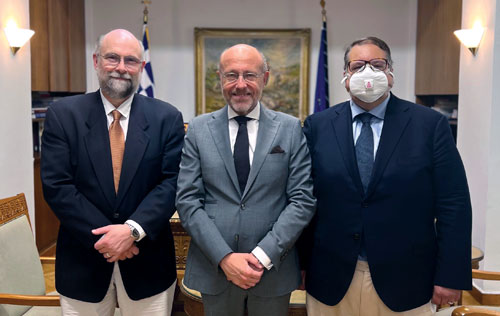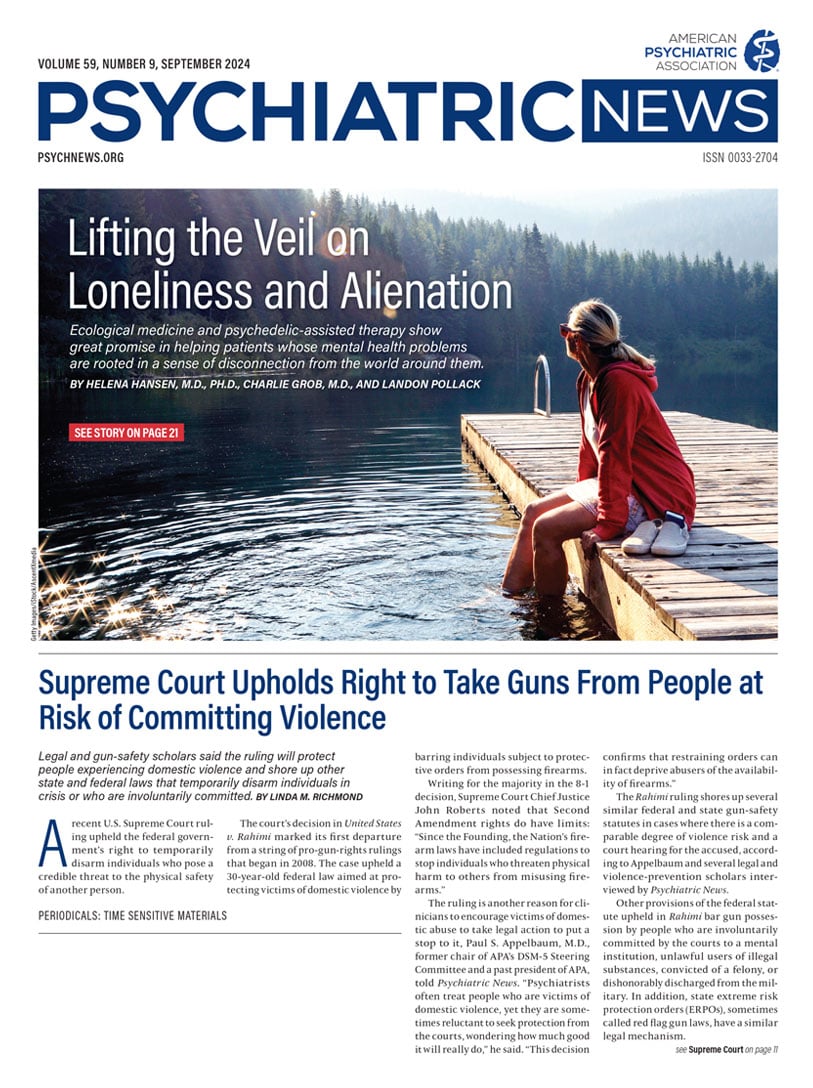The APA brand commands a lot of attention overseas.
That’s the message that psychiatrists Philip Candilis, M.D., chair of the APA Ethics Committee, and Vasilis K. Pozios, M.D., immediate past speaker of the APA Assembly, heard when they visited Greece in May at the invitation of the Greek Ministry of Health.
They were joined by George Karampoutakis, M.D., Ph.D., president of the Hellenic American Psychiatric Association, for a week of consultations with Greek health authorities followed by a one-day conference in Athens on climate change and psychiatric dimensions of disaster.
“What was most significant for me was recognizing how much the Greeks value U.S. psychiatry,” Candilis told Psychiatric News. “We may not realize how well trained and resourced we are in the United Sates in comparison to other communities and countries. I was moved not only by being able to give back to the country of my origin but by the realization of how significant our contribution as American psychiatrists can be internationally.”
In addition to climate change and psychiatric dimensions of disaster, Greek health authorities were eager for American psychiatric expertise on a host of other topics—especially forensic psychiatry, specialty courts for individuals with mental illness in the legal system, community outreach, and treatment of individuals with mental illness in prison.
At press time, APA immediate past president Petros Levounis, M.D., M.A.—who visits the country regularly to see family—was also planning to speak in person with Greek health authorities and leaders of the Hellenic Psychiatric Society (the Greek equivalent of APA) in August. “I want to expand the collaboration between Greek and American psychiatry to include a focus on prevention and treatment of addiction,” Levounis said. “Advances in the science of addiction have enhanced our understanding of tobacco, alcohol, and opioid use disorders and the technological addictions to internet gaming and social media. Sharing these advances should be a part of the growing collaboration between APA and the Hellenic Psychiatric Society.”
During their visit in May, Pozios and Candilis met with Dimitrios Vartzopoulos, M.D., Ph.D., deputy minister of health, and Christos Triantopolous, deputy minister of climate crisis and civil protection, as well as Christos Hadjichristodoulou, Ph.D., president of the Hellenic National Public Health Organization (NPHO). Pozios and Candilis also consulted with regional leaders in Thessaly—a critical agricultural region in central Greece badly damaged by flooding in 2023—and participated in the NPHO’s 3rd Conference of Public Health and Climate Change.
Among the goals Pozios, Candilis, and their Greek colleagues discussed were:
•
Forming a work group of psychiatrists and other mental health professionals to study the effects of climate change and resulting disasters in Greece over time. This may include collaboration on outcome studies in regions afflicted by climate-triggered disaster to assess effects on mental health and substance use, and incidence of trauma and intimate partner violence.
•
Developing a curriculum to educate local Greek communities and agencies in crisis management with a focus on mental health.
•
Sharing model disaster plans from the United States and Canda to manage fire and floods.
•
Planning a train-the-trainer seminar in Washington, D.C., for Greek officials interested in disseminating the
Sequential Intercept Model (SIM), a Substance Abuse and Mental Health Services Administration program widely used in the United States to divert persons diagnosed with mental illness from the legal system.
•
Collaborating on writing grants for disaster-relief programs available from the European Union.
Pozios and Candilis’ visit was made possible by their strong connections to Greece. Pozios, for example, has first-generation roots in Thessaly. “My father emigrated in 1969 from Thessaly, where my family had been shepherds,” Pozios said. “We witnessed firsthand the aftereffects of the flood last year and heard from several first responders. To return there and be able to offer our expertise and resources to these people who have a connection to my family origin was immensely meaningful to me.
“There is so much collective knowledge that we take for granted as APA members,” Pozios added. “Treatment guidelines, protocols for disaster relief, the vast wealth of our research knowledge, and our connections to academic institutions—we can forget that not every country has access to the resources we have. There are so many places around the globe that would benefit from this kind of collaboration where we directly interface with our colleagues in other countries and share our collective knowledge.” ■

